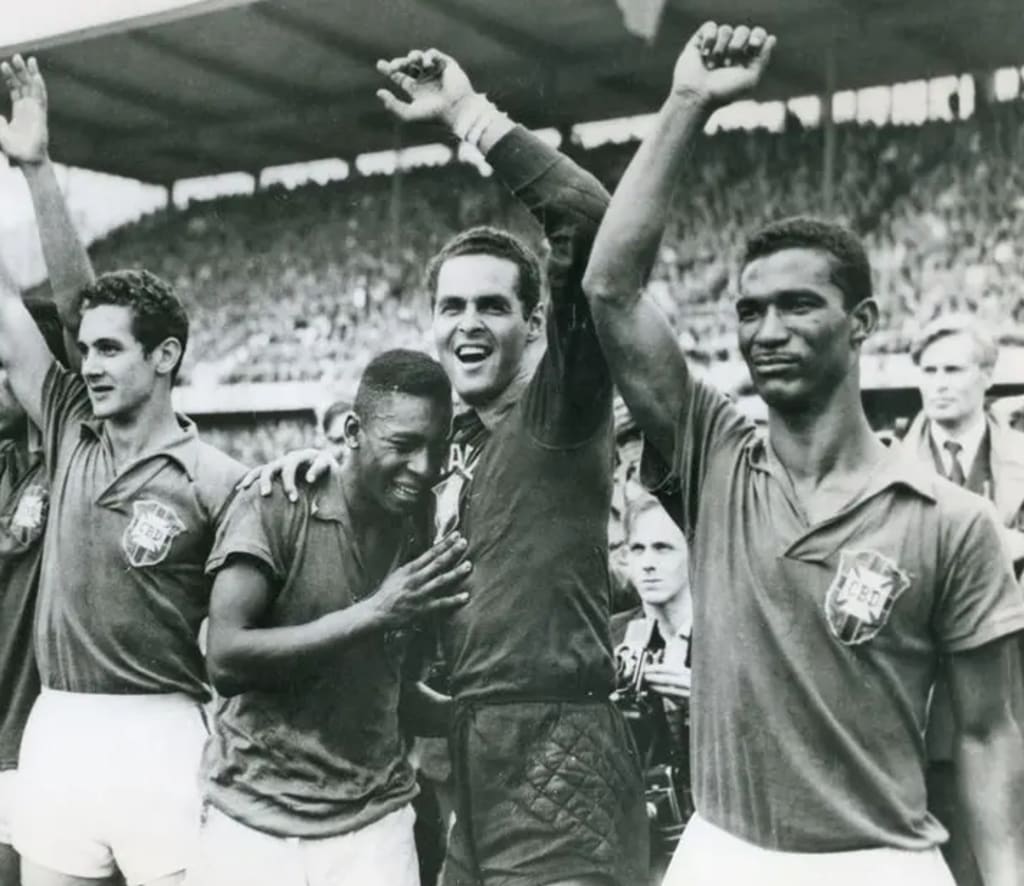What does a true king need to conquer?
A tribute to the everlasting King of Football.

The 1950 World Cup took place while the whole world was still struggling to recover from the immense devastation of World War II. Brazil, the host country, was facing economic depression, and the government hoped to uplift the spirit of the nation through the World Cup. They exerted their national effort to construct the Maracanã Stadium, which was the largest sports arena in the world at that time.
Only six teams from Europe participated in the tournament, and their performance was not at its best. The powerful Brazilian team achieved remarkable victories over Spain and Sweden, with scores of 7-1 and 6-1 respectively.
In the final match, Brazil faced Uruguay. The Brazilian people desperately needed the arrival of victory, and they truly believed in its coming. After all, Uruguay was a small South American country with a population even smaller than that of Rio de Janeiro. However, heroes never need to ask for recognition, and heroes on the football field do not necessarily come from heavily populated nations.
On the day of the match, 200,000 fans flooded into the Maracanã Stadium. Factories shut down, schools closed, and in Brazil, where television was not widely available, people strained their ears to listen to the live reports of the game coming from the loudspeakers on the streets. Shouts filled every street, and the whole of Brazil was focused on this match, or rather, waiting for news of victory.
When Uruguay scored the winning goal, a deathly silence fell upon Brazil. In the end, the small South American nation secured a 2-1 victory, defeating the mighty Brazil.
The Brazilians say that on that day, it was their "Hiroshima," as if their country had been destroyed by a nuclear bomb. Economic depression, political corruption, cultural backwardness— even their sole belief in football seemed to have abandoned them.
Where was their God, the God of the Brazilians?
In the slums, there was a burst of cheers as a young boy stole a sock from a neighbor's clothesline. They gathered on an empty field, stuffed the sock with various objects, tied it up with a thick rope, and shaped the filled sock into a makeshift ball. Excitedly, they began their game.
Not a single child had shoes, and they didn't even have a proper ball. The only thing they possessed was the name of their small team: the "Barefoot Brigade." However, when they confidently challenged other teams from different streets, they discovered that seemingly every street had a team named "Barefoot."
The two teams quickly engaged in intense competition. One player, a short and dark-skinned boy, stood out among them. He was agile, physically strong, and seemed like a star on the field. He fired a shot at the goal, and the ball rebounded, hitting the door of a nearby shop. The angry shop owner pushed the door open and shouted at the boy, "Fool!"
The other kids burst into laughter, imitating the angry tone of the shop owner, calling their nearby companion "Fool," "Fool." The young boy could hardly imagine that this nickname would follow him throughout his life. But it's easy for us to understand that at that moment, the young boy had already showcased his talent on the street field. Everyone needed a more affectionate name to address him, to dispel a bit of the magical aura surrounding their comrade and to bring themselves closer to him.However, this name not only failed to dispel the boy's magic, but it echoed through the streets of the slums, resonating across the world, becoming a symbol of Brazil, and even a symbol of football. This magical name is: Pelé.
Let's go back to the 1950 World Cup. The entire Brazil was in tears. Ten-year-old Pelé saw his father shedding tears for the first time.
In his memory, his father was always a resolute, serious, and brave soldier.
His father, Dondinho, was a professional football player. Although his career was mediocre, Pelé once claimed that the most difficult record for him to break was the miraculous achievement of his father scoring five headers in a single match.
His father taught Pelé to play football in a very Brazilian way. They often practiced a unique Brazilian style called "Futebol de Gávea" under the mango tree. Specifically, it involved using a mango to practice ball control. One can imagine that such footwork was both fierce and powerful, yet also agile, evading heaviness and turning it into lightness. Pelé would practice juggling the ball in the narrow streets, which allowed him to miraculously dribble past multiple defenders on the future football field.
His father's discipline for Pelé was extremely strict. One time, he caught Pelé smoking with other adult players. His father angrily criticized him and told him that smoking and drinking would ruin him, and he could never become a true player.
Since then, Pelé never touched cigarettes or alcohol in his life. Perhaps from that moment on, he knew that a true player not only had to defeat opponents on the field but also had to overcome himself off the field.
In his autobiography, Pelé later wrote, "In the past and the present, he (his father) has always been an ideal father."
Over the course of eight years, Pelé experienced everything that a true player, a true hero, should experience.
At the age of 12, Pelé, with exceptional football skills in the slums, finally encountered his first mentor in life.
Brasilido, a former Brazilian national team player, became a coach at a club called Baqu. After repeated recommendations from Dondinho, Brasilido decided to visit the field and see this magically talented boy described by Pelé's father. When they arrived at a street football game, Brasilido was amazed to see a child effortlessly outplaying the adults on the field. Proudly, Dondinho said, "That's my son."
Brasilido directly recruited Pelé into the club's team and, just as he had demanded of himself in the past, rigorously required Pelé to become a versatile player. He made Pelé play in any position, sometimes as a forward, sometimes as a defender, and even as a goalkeeper. This not only enabled Pelé to fulfill various roles but also allowed him to understand the game from different perspectives.
Later, Brasilido recommended Pelé to Santos, a famous professional football club in Brazil, with just one sentence: "He will be the greatest football star in the world."
However, Santos Club heard such recommendations every day, so they didn't take it seriously. But Pelé quickly proved his talent at Santos and became the team's leading forward.
In the early summer of 1957, as Brazil's national team prepared for the World Cup in Sweden, they began the process of selecting players. At that time, the Brazilian team boasted an abundance of talent, and Pelé didn't dare to dream of being chosen.
During the announcement of the national team roster, Pelé was visiting his hometown. He sat with his father, eagerly listening to the radio broadcaster as they listed the names of those illustrious players: Castilho, Gilmar, Nílton Santos, Mazola...
Suddenly, the radio uttered the name "Pelé." Overwhelmed with excitement, he leaped to his feet and embraced his father. It was beyond their imagination that a child from the slums would soon represent their nation in the World Cup.
As with any edition, Brazilians yearned for a victory that would bring honor and hope to their country. However, upon the team's arrival in Sweden, the players discovered that the Brazilian flags hanging there were incorrect.
Prior to the tournament, a psychologist, specially appointed for the occasion, scrutinized the entire team to finalize the starting lineup. His evaluation of Pelé was disheartening: childish, lacking determination, initiative, and a sense of responsibility... in essence, unfit to play at all.
The coach, with an impassive expression, listened to the psychologist's analysis, then nodded and said, "Perhaps you're right. However, you know nothing about football. Once Pelé recovers from his injury, he will take the field!"
And so, in the 1958 World Cup, Pelé singlehandedly scored six goals, becoming the youngest goal scorer in World Cup history. During the semifinal match against France, Pelé accomplished a "hat-trick," netting three goals within a mere 23 minutes.
In the 55th minute of the final, Pelé received a long diagonal pass from Nilton Santos. Confronted by Swedish defender Gustavsson, Pelé didn't dribble the ball, but delicately flicked it over the defender's head. Gustavsson, still in pursuit of Pelé, witnessed the ball inexplicably vanish. Before the ball could reach the ground, Pelé swiftly struck it, sending it soaring into the net. This audacious flick that deceived the defender stands as one of Pelé's timeless masterpieces.
Following the final, a Swedish newspaper bestowed upon Pelé the title of the "King of Football," a moniker that would accompany him throughout his life.
As a Brazilian citizen, Pelé brought honor to his homeland through his dedicated efforts. Henceforth, people would refer to Brazil as "Pelé's homeland." With football as their foundation of pride, Brazilians fearlessly held their heads high in the presence of the British, Americans, and Germans. For a country plagued by weakness and poverty, triumphs in sports became their source of dignity and resilience. Every nation requires heroes and legends, and Pelé became the hero and legend of Brazil.
After the 1950 World Cup, Brazilians mournfully questioned whether God had forgotten them.
Twenty years later, when Brazil clinched their third World Cup victory, The Times newspaper in England headlined, "How do you spell Pelé? G-o-d."
As the unrivaled champion of his sport, Pelé not only vanquished formidable opponents on the field but also conquered personal challenges in his life.
In his autobiography on his eightieth birthday, the King of Football recounted a poignant moment:
Following his father's passing, he returned home to pay his respects. His mother presented him with an old pair of shoes, from which she retrieved 400 reis. This was the currency of old Brazil, no longer in use due to numerous financial crises and subsequent currency changes.
"What's this?" Pelé inquired of his mother.
"This is the money you earned for the family in your first game, and I've kept it for you," his mother replied.
Overwhelmed with emotion, Pelé found tears streaming down his face.
He stated, "This money reminds me of how fortunate my life has been. God granted me a unique talent for football, and I've been lucky enough to use that talent and derive joy from it."
Though Pelé may seem distant to our generation, the story of an ordinary, underprivileged child who tirelessly honed his talent to perfection and continually surpassed himself will never grow obsolete. It forever imbues us with boundless courage and strength.
A tribute to the eternal King of Football, the true embodiment of a champion: Pelé.
About the Creator
Enjoyed the story? Support the Creator.
Subscribe for free to receive all their stories in your feed. You could also pledge your support or give them a one-off tip, letting them know you appreciate their work.





Comments
There are no comments for this story
Be the first to respond and start the conversation.